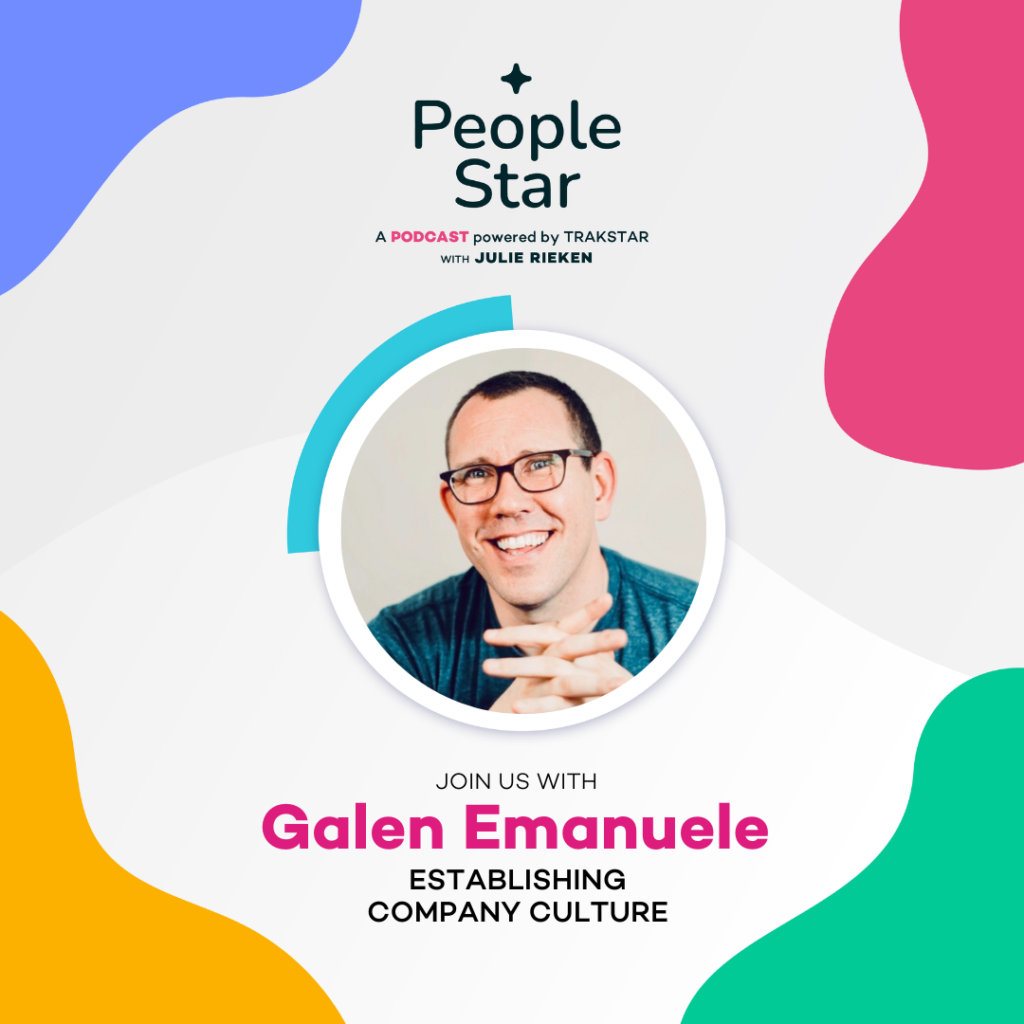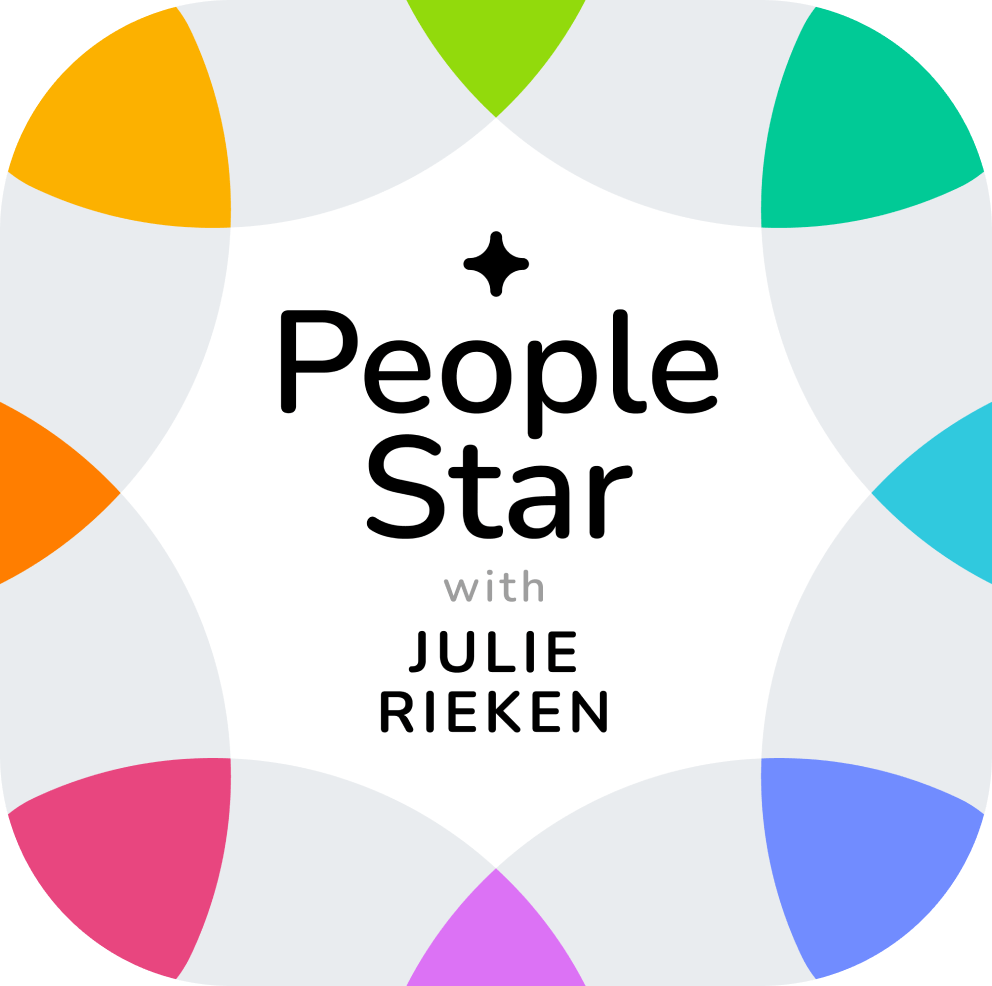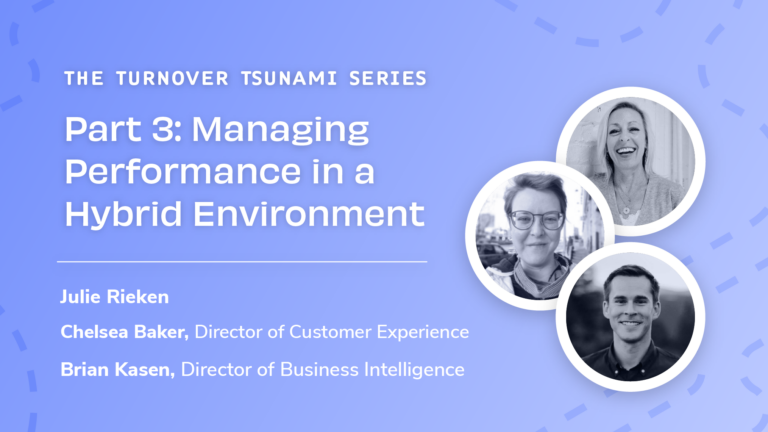PeopleStar Podcast_Galen Emanuele: this mp3 audio file was automatically transcribed by Sonix with the best speech-to-text algorithms. This transcript may contain errors.
PeopleStar Podcast Intro:
Welcome to the PeopleStar podcast. We deliver leadership perspectives from industry experts on their people, architecture, routines, and culture as they solve HR's newest challenges. And now your host, Julie Rieken.
Julie Rieken:
I am Julie Rieken, host of the People Start podcast. I'm super excited today to have with me Galen Emanuel. Galen and I met one another years ago at a Mile High SHRM Event, and I knew in that moment, oh, my gosh, this guy is magic, and so brought him in to help us with some stuff that Trakstar related to culture. And he taught us some lessons that we still adhere to today "yes, and", Galen and all of the wonderful things that you're creating right now as president and CEO of Shift Yes, and where you give out all kinds of great advice on different pieces of culture and building. And that's kind of, that's kind of your space and you own it. And leaving my first question to you, Gaylen is number one, welcome! And number two, how did you get into this?
Galen Emanuele:
Ok, well, hi, Julie, thank you, thanks for having me. I'm excited to chat it up here with you. So how did I get into this? People are generally bored by origin stories, I'll try to keep it really brief and quick, but I have always had sales and marketing positions in my career, I'm also just an entrepreneur in my blood. So I have always just wanted to build something and create something, and that's just part of who I am. And so I at sales and marketing kind of like leadership roles, and I'm just obsessed with leadership and books. You know, I just love that kind of, you know, human psychology and dynamics. Why do people do what they do? And then at one point, I started taking improv. So I started performing and teaching classes. I started taking classes and then performing in the teaching classes. But I started doing improv for a very long time. And so those two things around parallel in my life of business stuff and improv, at one point I became the marketing and sales director for the improv theater that I was performing and teaching at. And also just because I'm an entrepreneur, I had, you know, I've been doing improv for years and really obsessed with business. And I was like I saw a lot of crossover there, an opportunity for teaching business people to take.
Julie Rieken:
Gale, I …
Galen Emanuele:
Yeah?
Julie Rieken:
You say it's like peanut butter and pickles. I'm not sure how you made this connection.
Galen Emanuele:
Oh, well.
Julie Rieken:
But continue I'm, I'm still struggling to think you're like I see these connections, what?
Galen Emanuele:
Well, and I wasn't the first person ever to do that, to sort of think about like how improv skills and tools and concepts sort of apply to, you know, to business and different sort of areas of life. People like being more creative or thinking on their feet, that kind of stuff. That wasn't really my focus when I did it, I just saw a lot of connection between improv in terms of communication, in terms of personal impact and emotional intelligence, self-awareness, how you make other people feel, and other people's experience with you. And so I just started putting on classes and developing curriculum and taking these concepts and principles of improv around saying yes, listening, being present, making other people look good, embracing change and failure, being positive. And I just yeah, I just started to develop curriculum and see what worked and worked with diverse teams and leaders in terms of just applying these to, you know, directly for communication, for team culture, for leadership skills and that kind of stuff. And I fell in love with it. It just took off within a couple of years of doing that. I was working with Microsoft and bigger companies, and I was like, this is the only thing I ever want to do for the rest of my life, I love it. So I left and started my own company, and that was seven years ago now. So and then that sort of evolved from doing like skills training or communication and stuff into culture, into like just broader leadership ideas. And then, you know, really establishing, developing this, you know, culture, defining culture inside organizations and teams to just increase people's engagement performance. Like, you know, to change the way people show up together and treat each other at work is basically that's my jam. So that's how I got into this! And it's sort of like it just turned from, you know, small workshops doing skills stuff to speaking at a conference and working with bigger teams. And it just sort of evolved. And I've evolved, right, and learned a lot in the process over, you know, hundreds and hundreds of teams and companies and organizations and developing more and more curriculum and content and refining things. So, yeah, that's how I got into it. That's what I do. I love it. It's so much fun. It's really, really fun. So.
Julie Rieken:
It's all super cool to hear you talk about it. You just have energy on this whole thing. It's so clear that you love it. And I guess the biggest thing that I really love to hear from you today is this is clearly your space and you work with people on this. How do you help people think about defining a culture and establishing culture inside an organization and being deliberate about it? I mean, it may seem like an easy question, and it's not because cultures can evolve in different ways. How do you help people think about this?
Galen Emanuele:
Yeah, and that's probably my sort of like a life's work right now is to get people to understand how to do that, right, because I think culture, we talk about culture, if you bring, you know, 30 HR people or 30 business leaders in a room and be like, how do you define culture? What is culture? How do you, how do you establish culture? You get different answers from every single person. It's like so, you know, and that is really what I love to do, is help organizations understand like this is how you do it, right? Because we know that culture is good. Also, organizations understand that like a positive culture creates better business outcomes. But the question of like, how do you do it? And so I guess sort of starting at where what most companies have in place for culture and sort of culture 1.0, and that is, you know, a mission statement, a vision statement, a list of corporate values generally made up of trust, integrity, respect, excellence, teamwork, and fun, not to insult those, but that's sort of what most organizations have. And then that's our culture. And it's not. It's the beginning of culture. It's sort of like the 1.0 version of, OK, how do we what are we sort of doing here? And so, yeah, so I guess just to sort of talk about like how do you go deeper? What is the 2.0, 3.0 version of that when it comes to culture and defining culture? And so I think starting with what is it, like when we say culture inside an organization, what is that? And to me, just as a short, brief, very clear, kind of succinct answer is culture is the way that people show up, treat each other, and like approach their jobs. It's basically the ground rules that determine what it means to be part of a team. And so to establish exceptional culture requires a really clearly defined set of ground rules and behaviors and mindsets, not values and ideas, but behaviors, right, very clear sort of ground rules and rules of engagement for us that are clearly defined, that everybody understands universally, and that everybody takes ownership and accountability for, but also that nobody is exempt from. And that's really how you create an exceptional culture inside an organization is very clearly defined behaviors that everybody adopts, that nobody's exempt from. And so and it's like cool, even that is like, OK, great, but how do you do it? So I would love to quickly, kind of briefly go through what it, what's it takes us to define those things. How do you establish that if you're an organization or you're a business leader and you're like, OK, I'm tasked with doing this in my organization or my team, how do I actually go about that? So do you mind can I, can I dive in and be like, here's what it takes?
Julie Rieken:
Yes, please! I would love to hear this because, you know, it's the act of what do I do now and what are those behaviors? How do I, how do I go about it? This is actually a pretty complicated thing, and you have to be deliberate. So. Yes.
Galen Emanuele:
Yeah. Good. Ok. So my approach to culture is there are three C's, its clarity, commitment, and consistency. And I'll just quickly, briefly talk about each of those. So the first one, clarity being getting clear about the ground rules and the rules of engagement for your team. So what are not the ideas and values, not trust, integrity, respect, kindness, what are the actual behaviors? Right? Very, very clearly. So, for example, you might say, oh, like, excellence. And I'm like, OK, but let's talk about what excellence looks like in practice to a team, because excellence or integrity, they're very loosely defined, broadly understood concepts, right? And so what one person thinks of respect, somebody else doesn't. But when you have a very clearly defined sort of code of conduct for your team, that might look as specific as we don't badmouth other people or gossip about other people, you have a problem with somebody else, you go right to the source. That's an example of like this is a rules of, rule of engagement for our team or, right, excellence, you're like cool, excellence, like, yeah, OK, everybody wants to be excellent. But what does that look like in practice? How do you define that inside your organization? So you might say is defining your culture excellence, right, or continual improvement, for example, means that we ask for feedback on a regular basis. Everybody, leaders, employees, everyone, we ask for feedback from the people that we work with. And we don't see feedback as a criticism or a threat. We see it as an opportunity to improve and we receive it with grace. That's a very clearly defined behavior. And so when we establish those rules of engagement for our team and for the organization, we can look at every single individual employee and say they do or don't do this thing, right, and when anything that takes place that is outside of those rules of engagement, we can immediately address it and say, hey, that doesn't fly here. And so it's like, how do we address conflict? And it's not just how do we treat other people on the team. It's also how do we approach our roles. So we take full ownership and accountability for the things that are in our bucket, right, like we hit deadlines. If we say we're going to do something, we deliver on that thing, right? We take full ownership of making mistakes, that kind of stuff. So we produce high caliber work and we pay great attention to details like how do people, you know, your rules of engagement, your culture, like your DNA code, sort of what I call it, has to define how do people show up and treat other people on the team and how do they approach their jobs. And that has to be clear. So number one is do that. And it doesn't mean you have to start from scratch. Let's say you have five values or six values that you love, be like man, trust, respect, integrity, the work to do is to say for each one of those values, what is five examples of that in practice? Very clear, like couldn't be interpreted two different ways by two different people, what's a very, very clear example of that? And just unpack those into actual behavior so that you can show it to everybody on your team and use that as a guidance for like coaching and feedback and employee evaluation to say if you're doing all these things, 10 out of 10, this is what it takes to be successful here. So, number one, clarity, that. Number two, commitment, this one is simple, but if it's not in place, then everything you're trying to create in your culture is garbage and useless because commitment means that it has to apply to every single person across the board, a hundred percent. A frontline employee that's been there for three days and the CEO are just as accountable to these rules of engagement and this culture like there are no exemptions here. And if it's ninety-nine point nine percent of people, but one person is exempt like it's garbage, right? The commitment has to be a hundred percent, it has to apply to every single person in the organization, no matter what. It doesn't matter how senior your role is, it doesn't matter how long you've been here, it doesn't matter what function that you serve in the organization like it applies to every single person. And we don't allow anything outside of these rules of engagement to take place here without addressing it and correcting it. So that's important, commitment, hundred percent. And the third one is consistency, which you have to integrate these rules of engagement and these behaviors and mindsets into like the experience of your people. So you have to integrate that into hiring and onboarding, into training and development, into coaching and feedback. All of those things need to be anchored around this is the code of conduct for what it takes to be here. And, right, so even in the hiring process, usually showing people your cultural DNA code, these are the rules of engagement. This is how we operate here. Hiring and onboarding, training and development, right? Maybe you say as part of your culture, you say, great, when we have conflict with somebody else, we, you know, we remain in control of our emotional behavior. We make the other person feel listened to and we really like come in curious and vulnerable and looking to find a mutually beneficial resolution. That's how we deal with conflict. That might be part of your culture, but the reality in on the ground is that your people don't necessarily have those skills. People aren't coming. You're not hiring people that are like highly trained in non-violence, communication skills. So you're training and development initiatives can be informed by where you recognize skills and you know, gaps in skills or capacity of your people. So it's like, great. This is how we approach feedback. This is how we approach conflict. But we know that most people don't have the actual like tactical concrete skills in that area, that can be like, cool, let's invest, let's as part of onboarding, let's teach everybody this model that we use for feedback and teach people how to give and receive feedback well or navigate conflict well, right? It's like something we can put time into so that people can successfully live our culture, that consistency piece. And that's how do we integrate this into like meetings or in the employee lifecycle rewards, recognition, those kinds of things all centered around this culture that we continually reinforce. So that's it. Clarity, and what are the ground rules? Commitment, which is like it has to be 100 percent of every single person. If people on their executive team are exempt, it's garbage, don't waste your time because that's not culture. It's, right, your employees will see your culture for what it is. If you have people that are exempt from having their act alignment with it, which is just internal marketing, right, to keep lower-level employees in line, but it doesn't it doesn't apply to everybody. So commitment has to be a hundred percent. And then consistency, it's like how do you integrate that into every element of the employee experience, employee lifecycle. That's it!
Julie Rieken:
I. I don't even know what words to add to this other than I think I've got a lot to learn as a person, as a leader, and for us as an organization. This has been so helpful. I'm just thinking about what you said about, we have two things, we don't have trust/integrity that, you know, that common, we have independence and initiative. And I've never thought about bringing it forward into well, what behaviors would that look like and defining that. I think we should do that right away. And then I think you and I should probably continue working together, also. We have, we have a lot of things to think about our own organization about culture. And I think the commitment to it is really critical. So this has been super helpful. I love what you've shared with us today.
Galen Emanuele:
Awesome. Thank you! Yeah. You know, to me, culture is so important. The way that the, you're human beings that work in your company are the ones fulfilling your business plan like they are executing your business plan on the ground and we keep, everything else in business that we want to have a lot of success with retreat as a strategic priority, sales, marketing, operations, but when it comes to culture, a lot of organizations are sort of kind of way and hope to get it right, do a sort of like, OK, here's our values. And, you know, but translating that to elevate that, to say culture matters, it's like this is the entire employee experience here. And from the second you're hiring somebody in the hiring process, can you imagine how powerful it would be if you do this work and establish a culture this very, very clear, and concrete, and consistent that you're committed to. In the hiring process to any candidate coming into your organization, you can show them your cultural DNA code, be like this is what it takes to be successful here, this is a ten out of ten, and you can promise them right there, you will never have to work with anybody in this organization who acts out of alignment with this culture. This applies to the CEO, every single person here. This is the code of conduct that we follow. This is how we show up to go, this is who we are. This is how we operate together. And like, this is what it takes us to be successful. This is what you'll be rewarded for, hire, like promoted for in this organization, and like recognized. That's also the same things that would cause you to lose your job, right? Like, we are 100 percent committed to this, and accountability is everybody's in line with these sort of these rules of engagement that are positive and uplifting. And great, it's like we deal with feedback in a positive way. And DEI, it's like we encourage like diverse voices and like it's everything that you want to sort of embody as an organization, you put into this, you put into your code and your behaviors. But yeah, it's so powerful.
Julie Rieken:
Thank you so much. This has been fantastic! Appreciate you're sharing!
Galen Emanuele:
I love getting to talk about this. So, yeah, I hope that's useful. I hope somebody out there hears this. And, you know, there's this sort of like I think in the HR world sometimes there's this belief out there, people like Richard Branson being like, there's no secret sauce to culture, you just treat people how you want to be treated. And I'm like when I hear that, I'm like, that's so not true, it's not true?
Julie Rieken:
Oh, that's not, I'm with you. It's not my experience either. And we've had our ups and downs with it. And just thinking about how to be deliberate in the things that you, that you've brought forward today, I know they're helpful for me and I know they're going to be helpful for others, too. So this is super cool. Galen, before we wrap up, I just want to talk about I get your emails every Tuesday and I love them. Today's Tuesday, by the way. So I watched one of your videos this morning. It's called Culture Drop. And there's amazing couple-minute videos in there that I learned from. Tell us a little bit about that and how people can follow up with you and maybe get the same emails that I'm getting.
Galen Emanuele:
Ok, totally lovely. So, yeah, every week I put out a five-minute video every Tuesday morning called the Culture Drop. And so it also goes onto my YouTube channel. So on my website, which is just GalenEmanuelle.com, people can sign up for the Culture Drop. It's like you see it's not spammy. I don't sell things. There's no paid version. There's just like one free, quick, five-minute video every week around different topics, leadership, culture teams, communication, hiring people, firing people, basically all things business in this universe, so, yeah, if you want to sign up, that's the mailing list, Culture Drop in my website and then my YouTube channel, we put all those videos out there, too. So YouTube is another place to like subscribe to my channel and find that there's, you know, we've been doing this for a couple of years. So there's tons of videos out there, about a ton of different topics that are out there. So, yeah, and, you know, obviously, I speak at conferences, I work with teams, I work with leadership teams to go through the process of developing culture or do like skills training around feedback. And, you know, and the stuff that I did with you, the yes and stuff, by getting people to, you know, communicate better, emotional intelligence, this kind of stuff. So. Yeah. Anyways, thank you! Thanks for the plug, but I, there's a number of different ways to sort of engage with me, and some of them are totally free, the Culture Drop is just free content.
Julie Rieken:
I hope a ton of people sign up. I love it. It brightens my day. And we'll put your website and the links to this in the podcast notes so that people can easily sign up and enjoy it, just like I do!
Galen Emanuele:
Awesome!
Julie Rieken:
Cool. Thanks Galen!
Galen Emanuele:
It's so great to see you. Take care!
PeopleStar Podcast Outro:
Thanks for listening to the PeopleStar podcast. For the show notes, transcript, resources, and more ways to get a seat at the table, visit us at Trakstar.com/Podcast.
Sonix has many features that you’d love including automated transcription, world-class support, powerful integrations and APIs, advanced search, and easily transcribe your Zoom meetings. Try Sonix for free today.




